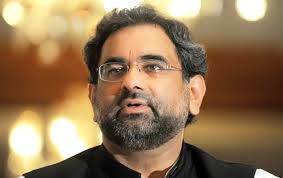ISLAMABAD
Prime Minister Shahid Khaqan Abbasi has said that his government will make minimum interference in business affairs to provide a conducive environment for trade activities. During an interaction with a group of business leaders in Karachi on Saturday, the prime minister said his government wanted to show maximum progress on economic front during the remaining period of the five-year term.
Talking to Pakistan Today, Federation of Pakistan Chambers of Commerce and Industry (FPCCI) President Zubair Tufail, said that the PM during his first visit to Karachi was informed about the difficulties being faced by the business community.
The major issue, according to him, was the high cost of doing business in the country. As an immediate remedy for the high cost of business was to reduce the price of electricity and gas to the industrial sector. “The prime minister has ensured his government will take up the matter in the cabinet,” Zubair said.
Arif Habib, one of the country’s biggest business conglomerates, informed the prime minister that the manufacturing has drastically been declined in the country, following massive imports which result in ballooning trade deficit. Restricted import of unnecessary or luxury items was needed to reduce the import bill. PM Abbasi was suggested to take immediate step to control rising import bill.
The business community leaders also demanded the PM to introduce Rs 100 billion development package for Karachi’s infrastructure. They, however, lauded the government for taking steps to improve law and order situation in the mega polis.
According to sources, the businessmen also welcomed the decision of the prime minister to chair the Economic Coordination Committee (ECC) himself, instead of Finance Minister Ishaq Dar.
During the meeting, the business leaders also complained about the harassment of exporters/traders by Federal Board of Revenue (FBR). However, FBR Chairman Tariq Pasha said that directives were issued to custom and tax officers to avoid raiding factories and business unit.
“Instead of pressurising the exporters and traders, who are already in the tax net, the big tax evaders would now be targeted for which FBR is receiving information from a third party,” he said.
He informed that the FBR is closely monitoring those who own big and costlier vehicles and frequently travel abroad. There are other factors to identify major tax evaders. Responding to a question about revenue collection targets, FBR chairman said that the target of July 2017 was surpassed with the collection of Rs 200 billion, which is 26.5 per cent than the collection of the same period of last year. The FBR had collected Rs 158 billion in July last year.
Pasha informed the minister that they have decided to assign quarterly revenue collection targets instead of monthly to the chief commissioners of Large Taxpayer Units (LTUs), Regional Tax Offices (RTOs) and Corporate Regional Tax Offices (CRTOs) for the ongoing financial year 2017-18.
The government had set tax collection target of Rs 4013 billion for the ongoing financial year.
The FBR would need 19.4 per cent growth rate over the last year’s final tax collection of Rs 3.362 trillion. The FBR had missed the last fiscal year’s tax target by a wide margin of Rs 259 billion. The FBR chairman said that the FBR missed last fiscal year’s tax collection target due to Rs 169.7 billion worth of tax concessions given by the government.
It suffered a shortfall of Rs 111 billion due to reduced General Sales Tax (GST) on oil products, Rs 16.5 billion due to reduced GST on fertilizers, Rs 11.5 billion relief due to textile package, Rs 28 billion relief due to zero-rating of five export-oriented sectors and Rs 2.7 billion relief on pesticides.




